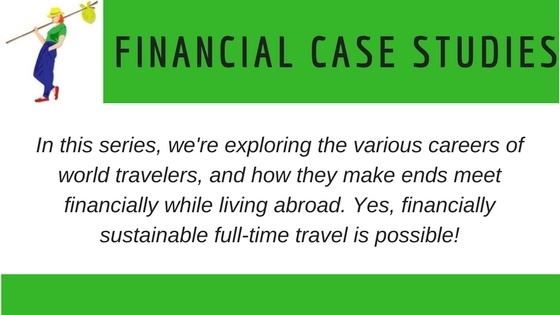John Clites was born and raised in the U.S. with wanderlust in his blood. To date he has visited almost 30 countries, with several still on his bucket list. He fell in love with Brazil on his first visit and returned many times over the years. Ten years ago when the financial crisis hit the U.S. he got financially hit from all sides (job loss, real estate market crash, stock market tank), and decided to liquidate and start over in Brazil. Nine years later he’s still based in Brazil (from where he travels for months at a time), teaching English online as his primary source of income. And he recently developed a course all about teaching English online!
Learn more about John’s flexible lifestyle and online business venture below.

This post was originally published in 2017. It has since been updated for accuracy of links and content.
How long have you been living/working on the road, and where have you traveled to?
I’ve been based in Brazil for nine years, but during those years I’ve become increasingly mobile. About six years ago I began teaching English online, and today I teach almost exclusively online, which gives me a great deal of freedom to roam.
I tend to stay in one location for several months or a year and then move on. I began teaching English online when I lived in a small town called Paraty. Then I moved back to Rio, then to the south of Brazil, then to a small city called Vila Velha, and now I live in a small city on the coast of São Paulo state called Guarujá.
Earlier this year I had a real itch to travel to another country. Inveterate travelers know that you really can only fight the urge so long before you succumb. Teaching English online, I saw no reason why I couldn’t travel. So during April – June I traveled through Colombia, and then spent a bit of time back in the states visiting family.
Two years ago I visited Europe, principally Spain, and I loved it. Next year I plan to return to Spain and also to see Portugal, which I’ve read and heard many good things about. And then there’s Southeast Asia. And New Zealand. Once you have a dependable source of online income, sustainable travel becomes a reality.
(See also: The REAL Key to Financially Sustainable Travel)
Please describe what you do for income.
So, principally I’m teaching English online, although I do teach some face-to-face classes still. When people find out that you are a native English speaker and a teacher, they sometimes press for classes! It’s not difficult to find work at all.
I have a really great group of students. What happens is that your student base builds through referrals. I began teaching a medical doctor three or four years ago, and through referrals from her, and from those she referred to me, I’ve developed a nice little niche teaching principally doctors of one sort or another. They are of course educated, and we have very interesting classes.
I also do some freelance writing as a sideline. I’ve written for International Living magazine, and TransitionsAbroad.com. More recently, I’ve written for Expat.com and for Live and Invest Overseas magazine.
I find that writing combines well with teaching. My classes of course are scheduled. The writing fits nicely in between those classes. And as I teach mostly online, as soon as a class is over, I can switch easily over to a writing project, and then back again when it’s time for my next class.
My vision now is to begin creating online courses such as the Teach English Online from Anywhere course. I invest the time upfront, but then the course will provide passive income. At least, that my hope!
How many hours per week do you work on average?
I generally teach between 20 – 23 hours per week. I spend perhaps another two and a half or three hours doing lesson prep on Friday mornings. And there will be the random admin items during the week, such as scheduling a class.
Many of my classes are at night, between six and nine. I also have many around lunch time, with a few in the morning or mid-afternoon. So my schedule may seem a bit fragmented. But for me it works well. I use the breaks, which are usually mid-morning and mid-afternoon, to go to the market, or to exercise, or to work on projects. It’s a schedule that works for me. And of course, I’m the boss, so I have great freedom to create the schedule I want.
How much money do you make?
Teaching English online is my principle source of income, and it pays all my bills month to month. My income fluctuates a little, as students come and go, or take vacation or a leave of absence because they’re busy. But about three years ago I switched to having students pay me a fixed amount each month, as if I were a school, rather than paying by the class. This has proven to be good for me, as I have a more steady income. Also, the students can budget a fixed payment, and many even have transfers made automatically to my account at the beginning of each month.
So, currently I make about 5,500 Brazilian reals per month, which is around US$1,750 at current exchange rates. That may not seem like much, but again, it pays my bills. My rent is 1,500 reals. I pay maybe 700-800 reals per month for food. Shortly I’ll be getting private health insurance, which will run about 600 reals. My gym is pricey, at about 330, but use it a lot and so it’s worth the expense to me.
Actually, a Brazilian friend recently told me that I am a little underpriced given that I am a native English speaker (most English teachers here are Brazilians) and have several years teaching experience. So I’ll start edging up my rate as I take on new students teaching English online, and as my current students hit their anniversary dates.
My writing income fluctuates a great deal. Many months I do no writing. Then I may have a large project. I just finished a large rewrite for Expat.com which paid US$800. It would be nice to have a steady writing income, but in my experience regular writing gigs are difficult to come by. Generally writing is one-off work. While writing generally pays only so-so, I continue to take assignments since I enjoy writing, and also because the payment is generally in dollars, which goes into a fund for annual travel. I might make $2,000-$,3000 for writing over the course of a year.
So, teaching pays for everything month to month, and writing funds travel. Hopefully my course, which has just opened, will also generate a decent income. But regardless, I still plan to continue teaching, since I really enjoy it.
Do you make enough money to support your lifestyle?
I do. I don’t live extravagantly, but I have a squarely middle-class existence here. I live in a small but newly re-modelled apartment in a newer building, only four blocks from a very nice beach. As this neighborhood is popular with vacationers, restaurants and services are a bit pricey compared to many other cities in Brazil. However, I have a very reasonable rent, and there are always inexpensive places to eat and enjoy a beer. I follow the old adage: Go where the locals go.
People back home find it difficult to believe that I can live on as little as I do. But they generally don’t realize how much money they spend just maintaining their stuff. A car is a good example. Besides the car payment, to have a car you have to pay for gasoline, insurance, maintenance, new tires, washes and waxes, parking, and those little pine-scented air fresheners.
I no longer have a car, nor do I feel the need for one. Markets, my gym, the beach – all are less than ten minutes walking. If I want to go downtown – I live in a primarily residential area – then I can catch a bus for US$1, or a taxi for US$5.
There is a lot to be said for leading a simpler lifestyle. I wrote an article about downsizing for International Living which was reprinted on the Huffington Post site. It’s probably brought more comments than anything else I’ve written. You can read it online here.
What do you like most about your career and lifestyle?
There is so much less stress in my life now. That’s the single biggest difference, and it’s a big one. I worked for years in consulting and software. There were always deadlines, and product issues, and often problems with the clients to be resolved. I traveled frequently, but it was forced travel, and often not to nice places. But it didn’t really matter, since I rarely got to see any of the town I was in anyway.
My work life is completely different now. Teaching English online, while it is a job, is much more relaxed. Many classes center around conversation, discussing interesting topics with intelligent students. It’s really not a bad job. Also, I’m the boss, so I get to choose which students I accept, and within reason which hours I work.
As I mentioned, I have breaks in my day. As I work from home, it’s easy for me to do laundry or cook or spend a few minutes cleaning during the day. I don’t have to do all that on the weekends the way I used to. Instead, the little chores are just breaks in my day.
I really enjoy having time to cook more. I always enjoyed cooking but often didn’t have time to do more than pop a frozen dinner into the microwave. Now I do a lot of cooking from scratch, and I can enjoy it, as there is no hurry. It’s much cheaper than eating out frequently, and also much healthier. I cook from basic ingredients, so I’m not ingesting tons of salt, preservatives, and other additives.
There is also much more time to walk, and simply to think. The sky here is clearing up now, so I’ll go for a walk on the beach here shortly.
What are some of the challenges you have with this career and lifestyle?
Today? None really. My income is pretty steady. If I find that I do want to pick up some more teaching hours, I just notify my students and within two weeks, often less, the referrals start coming in.
Of course, it takes a bit of time to build up a client base, as it does with any type of business. That can create some financial stress in the beginning. I recommend having a nest egg to draw on in the early days.
Aside from the money, some folks have a bit of tension when they begin teaching English online. I did, too, for a short time. A lot of the tension stems from a fear of teaching grammar. But the thing to remember is that as a native speaker, you inherently know what is correct and incorrect. You just need to learn some terms. If you have a good grammar text and stay a chapter ahead of the students, you’ll quickly settle in.
Apart from the work? Whenever you are in a new country, there will be a settling in process initially. Just expect that and dive in. Be sure to make an effort to learn the local language, at least some basics. And when something irritates you, remember that life back home wasn’t perfect, either.
What is your vision for the future of your lifestyle on the road?
I’ve enjoyed my time in Brazil. It’s a huge and very diverse country. But I’ve seen much of it, and now I’d like to see new places. I don’t believe that wanderlust can ever be cured, only treated by seeing new places.
Next year I’d like to explore Spain and Portugal in depth. I may even try to get residency in one of them. Once in Europe, you have so many options for travel to other places, and so much culture at hand.
I also would like to explore Southeast Asia. So depending on how things go, I may head to Thailand or Vietnam next year.
In the meantime, I am happy where I am. From my living room, I have green hills to the right, a bit of ocean to the left, and birds singing throughout the day. It’s not a bad life right here.
Any advice for the aspiring traveler about living and working on the road and managing finances?
Like you, Nora, I believe in slow travel. Renting an apartment for a month or a few months is so much cheaper than paying for a place, even a bed in a hostel, by the night. Also, when you have access to a kitchen and can stock food, you can slash your food bill. Slow travel also allows you to really immerse yourself in a place, and to learn a bit of the language.
I would advise preparing a pro forma budget to the degree possible. Of course you can’t anticipate everything, but estimate what you can, and then apply a pad of perhaps 25% – 30% to cover the unexpected. If you plan to post up in a larger city, Numbeo.com can be very helpful for estimating basic expenses. Facebook groups and forums can also give you some idea of costs.
If possible, save up enough to cover your basic expenses for three to four months. That may seem like an impossible task, but if you sell your car, or move back in with mom and dad for even a couple of months, you can quickly build up a travel fund. The little things like a daily latte at Starbucks also eat up a surprising amount of money. Take a hard look at finances and trim wherever possible.
If you plan to work abroad, do what you can to line up work before you arrive. But that’s not always realistic. For many countries – and Brazil is a good example – there is work around, but it’s almost impossible to get hired until you arrive and the employer can talk to you in person. The best that you may be able to do is to investigate the local job market, to know what typical salaries are, and perhaps arrange some interviews beforehand. Just do what you can beforehand so that you can hit the ground running.
Is there anything else you’d like to add?
Don’t be afraid to take a flyer. A stint abroad doesn’t have to be forever. You can return home.
And until you take that first step, you just can’t know where your journey may lead you. You can’t know, for example, whom you might meet, and the people you meet will have a great influence on your future direction.
Be open to trying new things. In my case, teaching English led to writing a book about how to teach English in Brazil, which led to writing for various publications. Teaching English online led to the creation of my course.
So don’t pigeonhole yourself. Assess your latent skill set and don’t be afraid to try try new things. You may not always be successful – but you may just surprise yourself. Believe in yourself.


